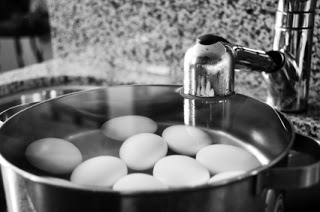When I first started practicing nutrition, I would eagerly meet with my new clients. We would talk about their week and I would write out a food plan. For example, I might suggest “2 hardboiled eggs with blueberries” for a breakfast choice or “salmon with roasted Brussels sprouts” for dinner. When clients would come back and I’d ask them about the boiled eggs or roasted vegetables their answers were a little evasive. It took a while but I eventually realized something important. You cannot assume cooking skills, no matter how basic. I now assume the opposite. Today, I was on the phone session with a client in Chicago and I asked her if she made the eggs I saw on her food journal. She said “no, I take them out from Whole Foods, they make them better than I do, mine turn greyish.” Here was someone who had boiled eggs but didn’t get great results. Hard-boiled eggs, and eggs in general, are one of my all time favorite foods. Though you’d think, as I used to think, boiling eggs was fairly straightforward, it is botch-able.
The Pot
The pot you use should be large enough to hold the eggs in a single layer. No egg stacking.
The Eggs
Eggs should be neither too young nor too old and organic. Farm-fresh eggs will be difficult to peel. Instead, wait 3-5 days to cook new eggs. Place your eggs gently! in the pot and if you like boiled eggs as much as my younger son and I do, make half a dozen at a time.
The Water
Add enough cold water to just cover the eggs. I use filtered water. Some may say that’s unnecessary. Some may say filtering water is unnecessary. They haven’t seen the inside of a pre-war apartment’s pipes. We renovated, I saw, I filter our water. Do not add salt to the water as this makes your eggs tough. And if your eggs float to the top when you add water, they’re too old or rotten.
The KEY to Better Boiled Eggs
The truth is that hard-boiled eggs is really not a truthful name, I’ll explain. You put a med-high flame under your pot of eggs and THE SECOND it starts to boil; you cover the pot, remove eggs from heat and turn off the heat. The eggs should not ever spend time in boiling water. I guess one could say that if it’s at 212 degrees it is boiling even if not bubbling but let’s move on. You cover the pot and let the eggs sit. The three-minute concept is another myth unless you like soft-boiled eggs or Salmonella. The eggs sit in the water for a minimum of 5 and a maximum of 15 minutes. If you take a shower and dry your hair and come back to your eggs, they will be grey. My vote is for 12 minutes for medium eggs. Add 2 minutes for large or extra large.
Cold Shower and Shake
When you’re eggs are done cooking, drain the hot water but keep eggs in the pot. Run them under cold water for 2 minutes to cool them down and then drain the cold water. Put the lid back on the pot and shake back and forth for 30 seconds. The eggs will start to peel themselves. Finish peeling under cold running water.
You can store boiled eggs in a container for up to a week.
That explanation exhausted me so I’ll cover roasting vegetables another time.
When it comes to hard cooking eggs are you a) phobic, b) prone to making greyish eggs or c) a pro? Do you have any additions or corrections of my method? I’d love to hear.



THIS IS GREAT!! Seriously, I either cooked the best eggs, or they fail…I can never figure out the right way to do it. Many times I can't get the shell off either, which drives me insane.
Thanks for this post. I need to print it and hang it on my fridge. I agree with the 12 minutes, that's the only thing I actually do already (my aunt taught me that one).
My eggs are always tough to peel. The post is perfect timing for me because I just put eggs on the stove. I prefer my eggs warm so only make what I (and my youngest) plan to eat. Do you reheat your eggs at all or you a cold egg person?
oh wow, i definitely thing i boil eggs for too long. thanks for the tips!
can your next tutorial be on egg poaching? 🙂
Gina- you're an early riser like I am. I'm so happy you two found tips that were new. Yay. Report back! And Claire, I am fine with cold eggs, yes.
woah love this post!! my hard boiled eggs are so hit or miss!
I just finished breakfast and my eggs were fantastic! Thanks for the tips.
My understanding is that you actually CAN let the eggs sit longer than 15 minutes – they will get to as hard boiled as they can get, but they shouldn't overcook because the water is cooling down, so long as you didn't let the water actually boil (or boil for too long). My mom had taught me to let them boil for 1 minute, sit for 10, but I prefer your method, Lauren – makes better eggs.
Definitely bookmarking this one. It's such an easy and healthy snack for the kids but I usually avoid making them because I always seem to under/over cook them!! I like these cooking tip posts =)
Great post on one of the few foods I really dislike. The only time I hard boil eggs is at Easter , but I will be cooking up eggs every other way most days of the week. (Alhough I do not care for Salmonella, I do enjoy a good soft boiled or poached egg.). I will bookmark your post, because despite my hard boiled egg phobia, my husband and kids like them, so maybe I'll try your method out for them one of these days.
EA- our food paths diverge, don't like boiled eggs, hmn. Actually, Easter eggs are a problem because many people rush out to buy and end up cooking them "too fresh". M- the standing for 1 minute some people say (on heat but covered) but I always remove it from heat.
I'm not crazy about hard-boiled eggs. I prefer mine soft-boiled! I put them in water, bring it to a boil and then let them sit in the water for exactly 4 minutes. I like my yolks nice and runny!
I also love hard boiled eggs, and so does my son. (I love egg salad too, just light on the mayo, and I add a little more mustard, and celery for a little crunch.) Interesting that you say not to use salt – I always heard that adding salt to the water helps make the eggs easier to peel. But the key to making them easy to peel is using non-fresh eggs. I make sure I have them around for at least a week, preferably 10 days, before I boil them. Then the shells will come off practically in one piece. I always let mine sit in the water (covered and off the heat) for a good 15 minutes, but not longer than 17 minutes (I use extra large).
I feel like roasting veggies is not as complicated, but maybe there's something I'm missing so I'll look out for those tips!
This is so great! Last Easter I got ready to boil eggs to dye and it took me a second before I realized that I wasn't 100% sure how to do it! Thankfully I figured it out 🙂
You are so right about not assuming basic cooking skills. I have made that mistake too. I have found, like you did, that 12 minutes is the perfect cooking time for the eggs. As good as I am at cooking many things, hard boiled eggs took me a while to figure out!
I always love your posts lauren but this one is a print ant save! I'm one of those well intentioned but cooking clueless fans. Thanks!
Michele K
love this post!!
that was me 🙂
So true about not assuming cooking skills! I am always embarrassed to tell people about my lack of knowledge on a lot of cooking-related issues. The first time I boiled an egg was from instructions I found on the internet. This was last year. So thanks for this post!
That's how I boil eggs, and they always turn out great! My husband was actually shocked when I boiled him eggs the first time as they weren't grey and rubbery. His mom makes some of the worst eggs ever, and he thought his whole life that was normal… And I don't dare tell her that there is another way to boil eggs as she knows everything… Just avoid hard-boiled eggs at her house at all costs… 🙂
I do it quite differently. I bring a pot of water right before boiling point, then turn down the temperature to very low. Then I slowly add the eggs, one at a time, in a spoon, being very careful when removing the spoon when the egg touches the bottom of the pot so it does not crack. 5 min, on very low, pot covered, very gentle boiling. Then 10 min, covered but no heat. Then drain, then cold water, then I let them sit in cold water for a few minutes. I also make 5-6 at a time but keep them in the fridge with the shell, only peeling before consuming.
Thank you for the tips, Lauren. 🙂 Good post!
Thanks for the refresher course. I always have to google how to boil eggs. I also did not know that if your eggs float to the top when you add water, they’re too old or rotten. Very good to know! Now I want a hard boiled egg!
good tips as always thanks for the baby congrats he is called Roshan
Great tips!
I agree that we are not always sure of our clients cooking experience. That is why I think it's so important as an RD to have a cooking background.
I can hard boil them, but I look it up in the cookbook every time.
This is interesting because the only thing my husband can do in the kitchen…the ONLY thing…is boil an egg. He's very particular about them too…has a complicated timing process that only he can administer.
I'm suddenly inspired to make fun of this on my blog!
I think you should appreciate the intricacies of egg cookery before you poke fun. However, I'm all for the husband knock down posts. Conflicted I guess.
The concept of "not assuming cooking skills" is so important, even when it comes to things we may assume to be common knowledge. Great egg tutorial!:-)